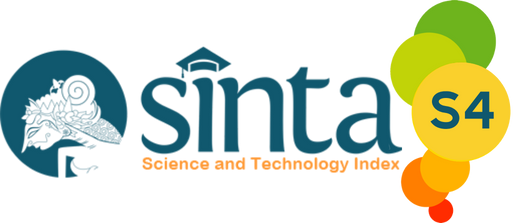Analysis of Game-Based Learning Models in the Motor Development Students 12th Grade Vocational High School in Surakarta
Abstract
Keywords
Full Text:
PDFReferences
Abdussamad, H. Z., & Sik, M. S. (2021). Metode penelitian kualitatif. CV. Syakir Media Press.
Arikunto, S. (2010). Prosedur Penelitian Suatu Pendekatan Praktis. Jakarta : Rineka Cipta.
Budiani, R., & Ningsih, R. (2023). Analisis Kecanduan Bermain Game Online Siswa SMK PGRI 4 KEDIRI. In Prosiding SEMDIKJAR (Seminar NasionalPendidikan dan Pembelajaran) (Vol. 6, pp. 243-251). https://proceeding.unpkediri.ac.id/index.php/semdikjar/article/view/3661
Camacho-Sánchez, R., Manzano-León, A., Rodríguez-Ferrer, J. M., Serna, J., & Lavega-Burgués, P. (2023). Game-based learning and gamification in physical education: a systematic review. Education Sciences, 13(2), 183. https://doi.org/10.3390/educsci13020183
Dahalan, F., Alias, N., & Shaharom, M. S. N. (2023). Gamification and game based learning for vocational education and training: A systematic literature review. Education and Information Technologies, 1-39. https://doi.org/10.1007/s10639-022-11548-w
Emerson, A., Min, W., Azevedo, R., & Lester, J. (2023). Early prediction of student knowledge in game‐based learning with distributed representations of assessment questions. British Journal of Educational Technology, 54(1), 40-57. https://doi.org/10.1111/bjet.13281
Fitriana, N. (2023). Penerapan Model Game Based Learning untuk Meningkatkan Motorik Halus Anak Usia Dini. Seulanga: Jurnal Pendidikan Anak, 4(2), 102-111. https://doi.org/10.54150/altahdzib.v2i2.247
Fitrianto, A. T., Habibie, M., & Prayoga, H. D. (2023). Teaching games for understanding (TGfU) developing gross motor skill In physical education. Journal of Physical and Outdoor Education,5(2),
24-31. https://doi.org/10.37742/jpoe.v5i2.226
Handayani, G. (2020). Development of Motor Learning Model Based on Game and Fun Activities. In 1st Progress in Social Science, Humanities and Education Research Symposium (PSSHERS 2019) (pp. 398-401). Atlantis Press. https://www.atlantis-press.com/proceedings/psshers-19/125943612
Hidayat, R. T., Maryono, D., & Budiyanto, C. W. Development of a Web-Based Assignment Information System by Applying Leaderboard and Quest Gamification Elements at SMK Negeri 2 Surakarta. (2023). Journal of Informatics and Vocational Education, 6(3). https://doi.org/10.20961/joive.v6i3.65934
Nurdin, N., Pettalongi, S. S., Askar, A., & Hamka, H. (2021). E-learning Adoption and Use Hype Cycle during Covid-19 Outbreak (A Longitudinal Survey). IJIE (Indonesian Journal of Informatics Education), 5(2), 68-78. https://jurnal.uns.ac.id/ijie/article/view/58233
Pujayanti, F. H., Sumiharsono, R., & Triwahyuni, E. (2023). Pengaruh Metode Game Based Learning Terhadap Kemampuan Motorik Kasar Dan Kemampuan Sosial Emosional Anak TK. EDUKASIA: Jurnal Pendidikan dan Pembelajaran, 4(2), 1435-1444. https://www.jurnaledukasia.org/index.php/edukasia/article/view/458
Ramadhanti, F. T., Juandi, D., & Jupri, A. (2022). Pengaruh Problem-Based Learning terhadap Kemampuan Berpikir Tingkat Tinggi Matematis Siswa. Aksioma, 11(1), 667-682. https://doi.org/10.24127/ajpm.v11i1.4715
Safira, N. (2023). The Effect of Puzzle Playing Therapy on Fine Motor Development in Preschool Children. Journal of Complementary Nursing, 2(1), 127-132. https://doi.org/10.53801/jcn.v2i1.61
Soleh, A. A., Triyanto, T., Parno, P., Suharno, S., & Estriyanto, Y. (2023). Tinjauan Pustaka Sistematis: Model Kemitraan antara SMK dengan Dunia Usaha dan Dunia Industri. JIPTEK, 16(2), 126-136. https://doi.org/10.20961/jiptek.v16i2.72697
Sugiyono. (2018). Metode Penelitian Kuantitatif, Kualitatif, dan R&D. Bandung: Alfabeta.
Sugiyono. (2019). Metode Penelitian Kuantitatif, Kualitatif & RND. Bandung: Alfabeta.
Tay, J., Goh, Y. M., Safiena, S., & Bound, H. (2022). Designing digital game-based learning for professional upskilling: A systematic literature review. Computers & Education, 184, 104518. https://doi.org/10.1016/j.compedu.2022.104518
Ulfatin, N. 2014. Metode Penelitian Kualitatif di Bidang Pendidikan: Teori dan Aplikasinya. Malang: Bayumedia.
Ulya, H. (2017). Permainan tradisional sebagai media dalam pembelajaran matematika. In Prosiding Seminar Nasional
Pendidikan (Vol. 6, No. 11, pp. 371-376). https://repository.ummetro.ac.id/files/artikel/967b29a8033b7621321b15c78166e74a.pdf
Utami, N., Setiawan, A., & Hamidah, I. (2022). Research Trends in the Use of Augmented Reality in Engineering Education: A Bibliometric Analysis. IJIE (Indonesian Journal of Informatics Education), 6(2), 50-56. https://doi.org/10.20961/ijie.v6i2.68326
Refbacks
- There are currently no refbacks.








